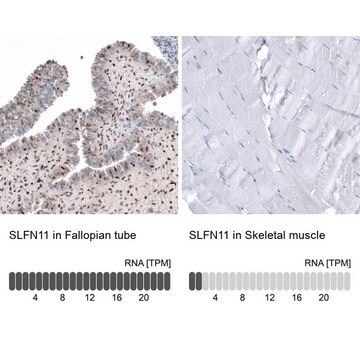MABF248
Anti-SLFN11 Antibody, clone 4G9
clone 4G9, 0.25 mg/mL, from mouse
Synonym(s):
Schlafen family member 11, SLFN11
About This Item
Recommended Products
biological source
mouse
Quality Level
antibody form
purified immunoglobulin
antibody product type
primary antibodies
clone
4G9, monoclonal
species reactivity
human
concentration
0.25 mg/mL
technique(s)
immunoprecipitation (IP): suitable
western blot: suitable
isotype
IgMκ
NCBI accession no.
UniProt accession no.
shipped in
wet ice
target post-translational modification
unmodified
Gene Information
human ... SLFN11(91607)
General description
Immunogen
Application
Inflammation & Immunology
Immunoglobulins & Immunology
Electron Mobility Shift Assay Analysis: A representative lot from an independent laboratory detected SLFN11 bound t-RNA (Li, M., et al. (2012). Nature. 491(7422):125-128.).
Quality
Western Blotting Analysis: A 1:500 dilution of this antibody detected SFN11 in HEK293T cell lysates transfected with SLFN11 and not in HEK293T cell lysates transfected with a negative control.
Target description
Physical form
Storage and Stability
Disclaimer
Not finding the right product?
Try our Product Selector Tool.
recommended
Storage Class Code
12 - Non Combustible Liquids
WGK
WGK 2
Flash Point(F)
Not applicable
Flash Point(C)
Not applicable
Certificates of Analysis (COA)
Search for Certificates of Analysis (COA) by entering the products Lot/Batch Number. Lot and Batch Numbers can be found on a product’s label following the words ‘Lot’ or ‘Batch’.
Already Own This Product?
Find documentation for the products that you have recently purchased in the Document Library.
Our team of scientists has experience in all areas of research including Life Science, Material Science, Chemical Synthesis, Chromatography, Analytical and many others.
Contact Technical Service